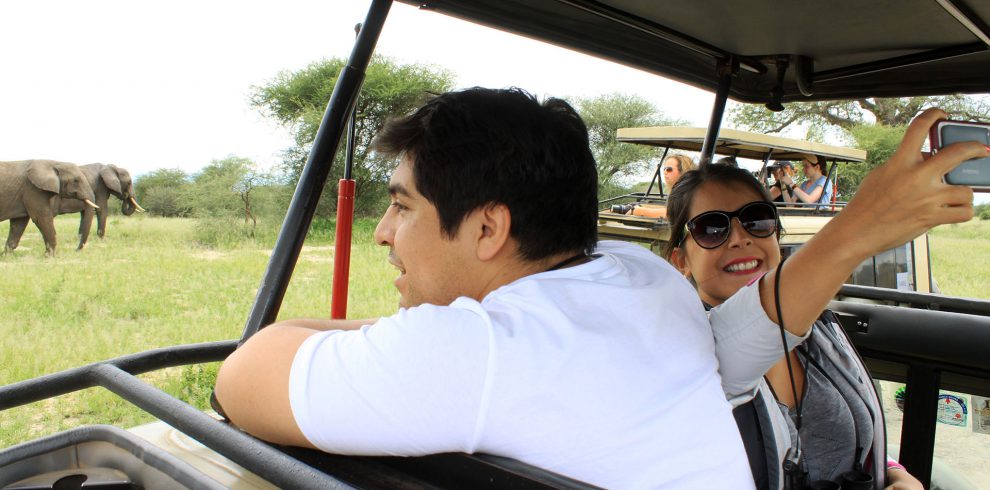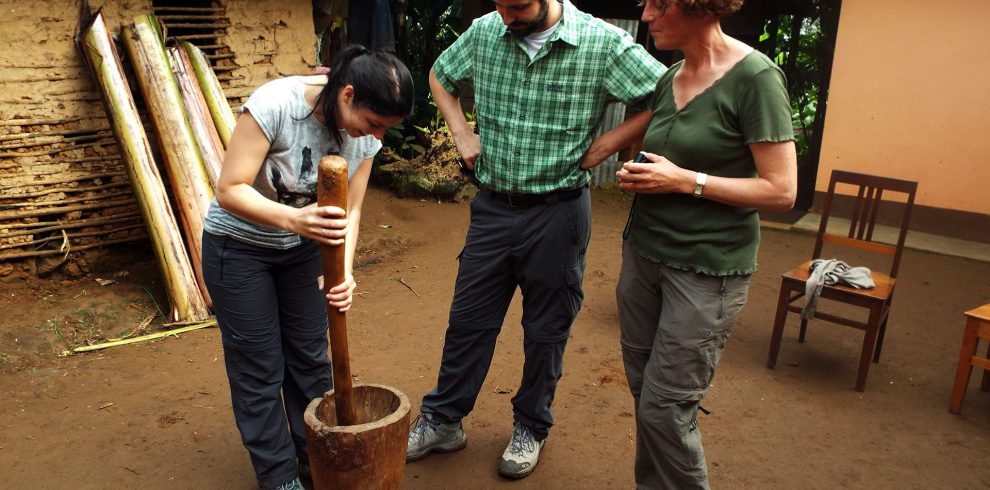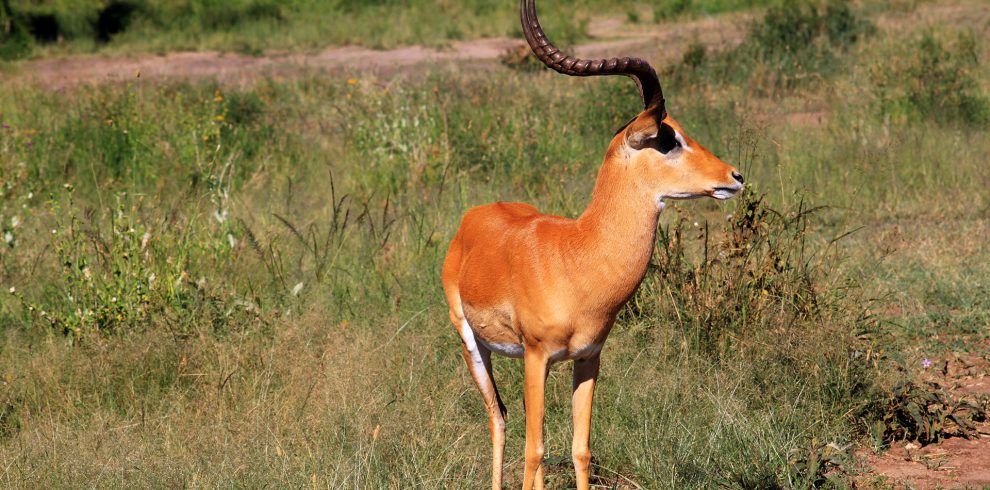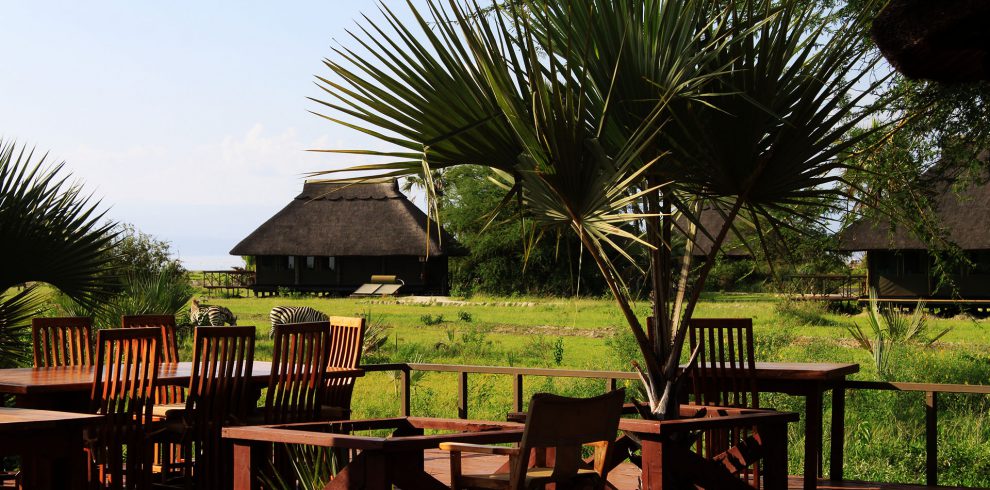(6 days tour/2 days in Hotel)
Recommended dates: July-August & November
Highlights
Follow the paths of the great Migration which is in the Northern and Central Serengeti
Overnight in the comfort of Luxury tented camps in the middle of Africa’s Natural Wilderness
Balloon Safari over Serengeti plains (Optional)
Visit Ngorongoro Crater which is a Natural Wonder of the world. You will see a lot of animals here in a short period of time.
Discover Tanzania’s vibrant cultures, meet its wonderful and friendly people: Hadzabe bushmen tour
<p>Our Driver Guide will pick you at the airport transfer to Arusha. Depending on your arrival time, you can decide to refresh and take your time by the pool after the long journey before meeting for briefing this evening.</p><p>Overnight at a standard hotel in Arusha. Half Board (bed and Breakfast) included.</p>
<p>After breakfast our guide will pick you from your accommodation in Arusha and transfer to Arusha Airport for your flight to Kogatende Airstrip. Approximately the flight to Kogatende takes 3 hours. </p><p>On Arrival in Northern Serengeti our guide will meet you and transfer to the accommodation in time for lunch. After the meal, head out for your first game drive in Northern Serengeti. Normally in between July, August and November months there astonish numbers of wildebeest and other animals at the banks of Mara River. Overnight in a luxury tented camp in Northern Serengeti. Full Board meals included.</p>
<p>As you awake for a second day in Northern Serengeti, you can contemplate that parts of this northern area can easily match the Southern Serengeti for the abundance of wildlife viewing, especially between July and September.</p><p>After your breakfast, you will embark with your driver-guide on a full-day game drive, looking out for elephant and buffalo, eland and gazelle. Maybe you’ll be lucky enough to spot something really special: perhaps a cheetah, or even a rare black rhino, of which a small population are resident here. Of course, during these months the Great Migration remains the real focus, with the mighty Mara River proving the obstacle for wildebeest as they seek to cross to and from the Maasai Mara in neighboring Kenya.</p><p>Overnight in a luxury tented camp in Northern Serengeti. Full Board meals included.</p>
<p>Before leaving the northern part of amazing Serengeti, we take the opportunity this morning to spend more time observing this wonder of the natural world. As well as the huge herds, other animals in the Serengeti include giraffe, gazelle, impala, hartebeest and waterbuck – your driver-guide will be on the lookout for these, as well as some of over 500 species of birdlife that have been spotted here, and will be able to tell you all about them.</p><p>In the afternoon, we return to the central part of Serengeti, where you will be taken to your accommodation for relaxation and your evening meal.</p>
<p>Waking up in the Serengeti is something really special. Sights, sounds and smells of Africa are all around us, and ahead is a full day of adventure in the world’s most famous national park. After breakfast, we start today with the morning section of our game drive in Serengeti National Park as we head to Ngorongoro Conservation Area. Overnight in Ngorongoro Conservation Area</p><p>Not: For those who have booked the Balloon Safari for today, you will be picked up from the camp at 05.00 hours for a 06.00 hours departure. If you wish to book balloon safari, please let us know in advance, The price is $540 per person. After your 60 – 90 minute (depending on wind condition) aerial adventure, experience bush breakfast and champagne, thereafter your driver guide will pick you up for your full-day game drive.</p>
<p>This morning we will have a very early start to make our way to the crater where we will we descend from the upper rim, driving down a steep track that drops a staggering 600m to the grassy plain, lake and marshes of the basin floor below. The crater provides a unique wildlife spotting experience and is home to the Big Five. Among the animals to watch out for are elephant, lion, cheetah, buffalo and rhino. The perennial marshes teem with birdlife.</p><p>The crater itself, technically classed as a caldera, owes its existence to the violent fracturing of the Rift Valley over a period of some 15 million years ago. At one time a volcano occupied this spot that then became extinct and collapsed into the empty magma chamber beneath it leaving only the gigantic natural basin which is now considered a veritable 'Garden of Eden'. Picnic lunch will be served at the crater</p><p>In the evening relax at the pool spend the rest of the day at leisure in a standard hotel accommodation in Ngorongoro.</p>
<p>Lake Eyasi is a very scenic soda lake found on the southern border of the Ngorongoro Conservation Area. This less visited lake lies at the base of the Eyasi escarpment on the western rift valley wall. This afternoon you will be introduced to the extraordinary people who belong to an indigenous tribe known as the ‘Hadzabe’ (hunter-gatherer Bushmen). The tribe inhabits the shores of Lake Eyasi as do the Nilotic-speaking Datoga tribe. You will visit these tribes, which will include a visit to their homesteads, learn about their way of life, animal tracking, medicinal plants, and much more. Some wildlife and a wide range of bird species can be viewed during walks around the lake, which can be arranged.</p><p>In the afternoon transfer to Arusha. Overnight at a standard hotel in Arusha -Half Board (bed and Breakfast) included.</p>
<p>Our Tour ends today. Our guide will transfer you to Kilimanjaro International Airport/ Extend your safari with Zanzibar holiday.</p>
The Trip Cost Includes
- Transfer to and from the airport
- Accommodation before and after safari
- Land Cruiser 4x4 with pop-up roof during safari
- Experienced English-speaking safari guide service
- All park conservation fees;
- Meals as stated in the itinerary
- Bottled mineral water in your safari vehicle
- Government taxes and levies
- Medical kit;
- Binocular (1 per SUV);
The Trip Cost Excludes
- Air tickets;
- Visa fee;
- Travel and health Insurance
- Tips to your safari guide, porter, hotel staff e.t.c
- Items of personal nature
There are some factors that make safari in Tanzania exceptional: First, hunting is strictly prohibited in all the National Parks, which makes for one of the highest densities of wildlife on the continent; Second, high Park fees keep the number of visitors relatively low, making for a more exclusive experience. Moreover, unlike other countries, where one often finds small family cars on the road, all Safaris in Tanzania are conducted no off-road driving in the park, which enhances the sense of being in the wild.
We recommend comfortable light clothing for the day and something warmer for the evenings, which can be chilly in the northern highlands. Comfortable walking shoes are a must for those planning on walking in the parks (must be booked in advance). You will further need a hat, sunglasses and sunscreen.
Generally, the climate in Tanzania is warm with maximum temperatures 32 degree centigrade. Early morning and evenings can be slightly cold with minimum temperatures reaching 12 degrees centigrade. Winter is from May to September, summer from October to April. Rainfall is seasonal with short rains in November and December.
Citizens of the EU and USA can acquire entry visas at international airports in Tanzania as well as other border crossings. Visa costs: generally USD 50 (USD 100 for the citizens of USA). For detailed information red: https://eservices.immigration.go.tz/visa/guidelines
Citizens of the following countries should receive a so-called referred visa in the nearest Tanzanian diplomatic institution before coming to Tanzania:
• Afghanistan • Azerbaijan • Banglades • Chad • Djibouti • Ethiopia • Eritrea • Equatorial Guinea • Nigeria • Pakistan • Kazakhstan Republic • Kyigten Republic • Lebanon • Malin
• Mauritania • Niger • Palestine • Senegal Iraq • Iran • Somalia • Sri Lanka • Somali land • Sierra Leone • Tajikistan • Turkmenistan • Uzbekistan and • Syria • Yemen • Stateless persons or persons with refugee status.
There are 3 International Airports in Tanzania: Zanzibar, Dar es Salaam and Kilimanjaro. Your Tour Manager will recommend the most convenient of these depending on your itinerary.
One of our drivers will meet you with a sign bearing your/your group’s name at your airport of arrival regardless of the time of day.
The official currency of Tanzania is the Tanzanian Shilling. There are several banks across the country that offers money change services. You can also make cash payments in US$. Just keep in mind that notes issued before 2003 may not be accepted or accepted at a lower rate of exchange. You may also change Euros and some other major currencies, though preference is given to US$ and the rate of exchange for other currencies may not be favorable.
In short- Tanzania is absolutely safe for tourists. Tourism provides a large part of the country’s foreign income and the local authorities take matters of security very seriously. Moreover, Tanzania is one of the most politically stable countries in the region and Tanzanians are very friendly as a people.
This said, some criminality does exist, just as it does everywhere else. We, therefore, recommend that you exercise common sense and follow the rules below:
Avoid the dangerous parts of any town- these are usually mentioned in most books and your guide will be happy to point them out.
• Do not leave your belongings unattended.
• When planning to take photos in towns, it is best to bring along a guide. This is not so much in the interests of safety, but, rather, in order to facilitate communication with the locals, who are – for cultural reasons – not always happy about being photographed and often do not speak English.
• After dark it is best to avoid walking and use taxis for all your travel within town. These are best organized by your tour operator or hotel reception.





